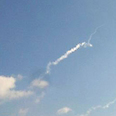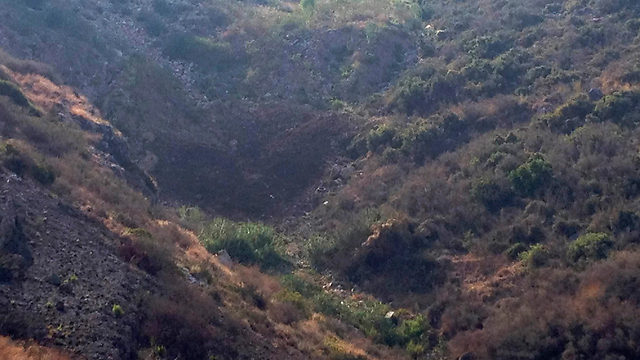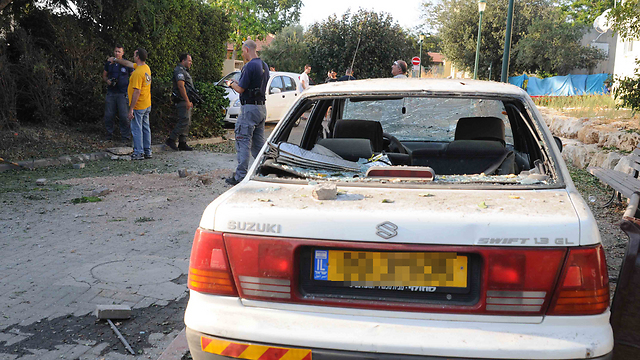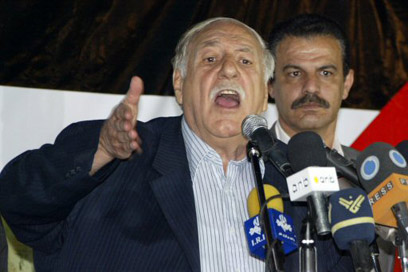
They hate Israel, but they hate Hezbollah more
Abdullah Azzam Brigades took responsibility for rocket fire at Israel on Thursday, but also defies Hezbollah for backing Syrian regime. Al-Qaeda affiliated group also linked to rocket launches at Eilat
The radical groups have already dealt several blows to Hezbollah, the most recent of which was the car-bombing of the movement's stronghold in southern Beirut, only several months after the first rocket attacks in the same area in May.
Related stories:
- IDF bombs Lebanon target in retaliation for rocket attack
- PM on rocket attack: We'll harm those who harm us
- 2 explosions kill 27 in north Lebanese city
As Hezbollah's leader is driving his movement deeper into the Syrian mire, his movement is garnering sharper acrimony, now starting to coalesce into actions, sometimes directed at Israel, like the rockets launched on Thursday toward the Galilee.
Iron Dome interception, Thursday
World jihad activity in Lebanon is not a new phenomenon. As early as 2007 the al-Qaeda affiliated Fatah al-Islam group fought bloody skirmishes with the Lebanese army in the Nahr al-Bared Palestinian refugee
camp in northern Lebanon, with casualties numbering in the hundreds.
About two months ago the city of Sidon was the scene for similarly bloody exchanges between the same
jihad group and the fanatic salafist sheikh Ahmad al-Asir's men.
Fatah al-Islam, which still has remnants in Palestinian refugee camps in the country, is joined by other groups such as the Lebanese-Palestinian Jund al-Sham, which operates in the Palestinian refugee camp Ain al-Hilweh in Sidon and the Abdullah Azzam Brigades, which is rapidly attaining a prominent place among the medley of groups operating in refugee camps in southern Lebanon, especially with regards to attacks against Israel.
Site of Israeli airstrike, south of Beirut (Photo: Reuters)
UN troops in a rocket landing site (Photo: Adham Mohamed)
Landing site in Gesher Haziv (Photo: Aviyahu Shapira)
The Abdullah Azzam Brigades is a radical Sunni group, affiliated with al-Qaeda groups around the Middle East, and has offshoots in Egypt, Iraq and other areas in the region.
The group was established in 2004 and named after sheikh Abdullah Azzam, a Palestinian, one of the
founding fathers of the Afghani al-Qaeda group and, according to some, the mentor of future al-Qaeda leader Osama bin-Laden.
Challenging Hezbollah
The group has a distinct Palestinian orientation, and is responsible for attacks in Egypt and for rocket fire toward Aqaba and Eilat. Its Lebanese presence became more prominent in recent years after it claimed responsibility for several rocket launches at Israel from southern Lebanon.
Its Lebanese branch is dubbed the Ziad Jarrah Battalion, named after one of the Lebanese perpetrators of the September 11, 2001 attacks.
Heading the group, according to some reports, is sheikh Majid ben-Mohamed Majid, a Saudi wanted by Saudi Arabia for security reasons.
Beyond its belligerent agenda against Israel and Jews in general, in recent months the group has also challenged the Shiite Hezbollah , following the latter's involvement in the Syrian civil war.
Abdullah Azzam Brigades take responsibility for firing rockets at Israel in 2009
In early August the group stated that as it has warned Shiites many times that they are on the bring of destruction, Nasrallah's bases are now viable targets.
They have since claimed responsibility for several attacks on Hezbollah posts, including in the Lebanon Valley and also in the Dahiyeh neighborhood in Beirut.
The Sunni Lebanese sheikh, Siraj a-Din Zarikhat, sponsored by the Abdullah Azzam Brigades, slammed Hezbollah in a tweet on Thursday.
"The Iranian party Hezbollah's mission to protect Jews will become a burden," he posted after claiming the Abdullah Azzam Brigades are behind the rocket launches at Israel.
Additionally, several other al-Qaeda-affiliated minor groups operate across Lebanon, and have placed Hezbollah in their crosshairs due to its Syrian involvement.
For instance, the 300-gunmen strong Abdullah al-Sabaa group which operates in Tripoli, the site of much bloodshed in recent months due to clashes between the anti-Assad Sunni extremists and his Alawite
supporters.
Sleeper cells
Concurrently, several groups operate in the village of Arsal in the Lebanon Valley area, near the Syrian border.
These groups, led by the Hassan Dar'am group, are deployed in the mountains bordering on Syria. Another al-Qaeda affiliated group is active in the al-Kaa village near the Syrian border.
Recently, Lebanese security services uncovered sleeper cells in the Mount Lebanon area. Lebanese Interior Minister Marwan Charbel said security services tracked a cell which planned to attack in several
areas in Lebanon.
The cell was exposed due to a work-related accident in an apartment in the town of Daria. "Lebanon is defended by coincidence these days," said the minister.
After the accident, security services searched the apartment and found a target list, maps, explosives and Jabhat al-Nusra flags.
A few days ago Lebanese security nabbed another cell in the Noaima village between Beirut and Sidon, where the IDF attacked on Friday morning.
A car carrying explosives was found and neutralized. Several persons have been arrested, including some Palestinians. Lebanese media affiliated with Hezbollah claimed the security forces thwarted an attack
against the Lebanese state.
The PFLP
Another piece in this puzzle is Ahmed Jibril, the leader of the Popular Front for the Liberation of Palestine (PFLP), which one of its bases was bombed by the IDF on Friday.
Ahmed Jibril (Photo: AFP)
The PFLP's spokesperson in Lebanon disavowed any connection between the group and Thursday's rocket launches. Jibril established the group in the '60s, after a rift with the Palestinian Liberation
Organization.
The PFLP objects to any peace deal with Israel and supports the armed struggle against it. Jibril is one of the few top Palestinian officials whose loyalty to Bashar Assad's regime remains unwavering.
As far as is currently known, he still resides in Syria, contrary to several Hamas officials who left after expressing firm opinions against the Syrian regime. Jibril was even lightly wounded some months ago in a
rebel attack in the Damascus area.
In recent years the PFLP has been linked to several rocket launches at Israel from southern Lebanon.
However, the group is now almost dormant compared to its initial years. The PFLP is mainly remembered due to the 1985 Jibril Deal, which saw the release of three IDF prisoners of war from the First Lebanon War in return for 1,150 prisoners in Israeli jails.
After the May 2012 Damascus bombing, alleged to Israel by foreign media, top Syrian officials including Assad himself announced the possibility of opening a new front on the Golan Heights against Israel.
Tapped as a potential dominant candidate in that front, Ahmad Jibril congratulated the new direction drawn by Syria.
After the attacks, an unidentified Palestinian group claimed responsibility for mortar fire toward the
Hermon.
- Receive Ynetnews updates directly to your desktop














